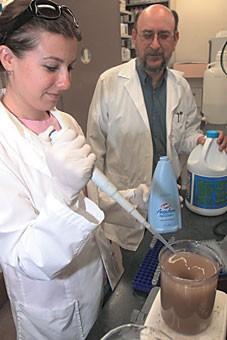A UA research lab is testing a product that could allow people to decontaminate poisonous water in their own homes during emergencies such as hurricanes, earthquakes or even bioterrorist attacks.
Charles Gerba, a soil, water and environmental sciences professor, said his lab is determining concentrations and combinations of bleach, water and other ingredients that will safely allow contaminated water to be consumed by humans and pets.
The research was inspired in part by Hurricane Katrina and is being completed as the heart of this year’s hurricane season approaches, Gerba said.
Gerba said his lab is using traditional bleach and newer formulations of bleach, such as Clorox Anywhere, to determine the concentration needed to kill waterborne viruses and bacteria, such as those that cause diarrhea and hepatitis.
The research found that adding one teaspoon of Clorox Anywhere to a gallon of contaminated water would kill all bacteria and viruses, while still keeping the water safe to drink and “”without the hard-to-swallow pool-water taste,”” Gerba said.
The average person can use this information to disinfect water in emergency situations when safe drinking water is not available, Gerba said.
Garrett Matlick, a finance sophomore, said he believes the research is important in order to cease potential death in future incidents similar to Hurricane Katrina.
“”Coming from a standpoint of living through a hurricane and experiencing firsthand the treachery of living in a coastal area, I know it’s important to come up with some form of purification,”” Matlick said.
According to the National Weather Service, 1,281 people died as a result of Hurricane Katrina. In areas most affected, floodwater was up to 6 feet high for weeks, and all of it was undrinkable.
Hallie Allweiss, a junior majoring in nursing and family studies from New Orleans, said the research will make a difference to people in her hometown.
“”This is an amazing research because I believe that any little bit helps,”” Allweiss said in an e-mail.
However, not everyone feels quite as optimistic about the research.
Lauren Todd, an undeclared sophomore from New Orleans, said she understands the UA is trying to help but does not believe it is the best investment.
“”The water issue wasn’t the thing causing the most danger, and I believe that the budget of this research could have been put towards something else that would have been able to save more lives,”” Todd said.
The project’s budget of $2,500 was funded by the Undergraduate Biology Research Program, Gerba said.









